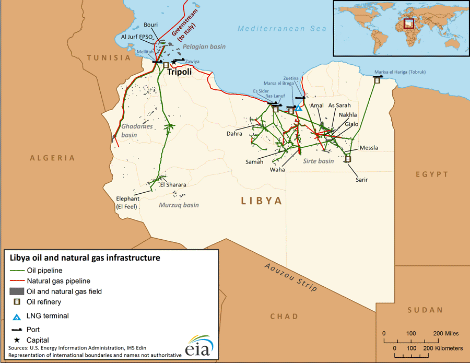
Attacking Energy in Libya- A New ISIS Strategy?
Last month, affiliates of the terrorist group ISIS attacked key oil fields and pipelines in Libya. On February 4th the group attacked the al-Mabrook oil field, killing 12 people, and a February 14th bombing of a pipeline connecting the El Sarir field to the Hariga oil port led to significant damage. These attacks prompted Libya’s state-run National Oil Corp to issue a statement calling for the nationwide shutdown of oil production if attacks continue. Foreign operators are also withdrawing workers, citing a lack of security and growing civil unrest in the country. The brutal beheading of 21 Egyptian Christians in Libya also prompted retaliatory Egyptian airstrikes, further adding to the discord.
Are these recent attacks aimed at Libya’s energy infrastructures indicative of a new ISIS strategy? Would attacking energy installations reap more benefits in the long term than capturing them?
The dangers of increased attacks against a country’s energy installations are clear. For example, attacks on a country’s oil infrastructure leads to an increase in crude oil prices. In Nigeria in 2006, a sequence of low-key attacks against energy installations led to a decrease of nearly 1 million barrels per day (bpd) and a subsequent increase in the price of crude. Disruptions in the price of oil (that we are seeing today, albeit for multiple reasons) lead to volatility in global markets, promote political instability in producer regions, and drive away foreign investment opportunities.
The recent attacks in Libya are a case study in what can, and has, happened. Following ISIS attacks at al-Mabrook and the El Sarir pipeline, oil prices increased to $62 dollars per barrel. Additionally, the group’s recent takeover of the Mabrook and Bahi fields has led to decreased oil production in the country. Current production sits at less than 350,000 bpd, a significant drop from the peak of roughly 1.6 million bpd before the ouster of Muammar Gaddafi. Although other factors contribute to fluctuating oil prices in the region, ISIS’s impact in Libya is clear. As oil analyst Olivier Jakob notes:
“The geopolitical risk [ISIS] is not something to write off.”
Should ISIS continue to move toward this type of campaign, the long-term effects of these attacks will be largely dependent upon the extent to which they can maintain their current hold over the areas they control. By destabilizing energy security in countries, which may be in their interest, they are faced with the dual problem of trying to enhance their own energy security. The same results could be attained by capturing- as opposed to destroying- energy installations throughout the Middle East. It will be important to keep an eye on the development of this strategy, as attacks on energy installations may be a precursor to more sustained efforts for their eventual capture and use by the terrorist group.
Can ISIS sustain a long-term campaign of attacking energy? Not likely. But a taste for the macabre is ISIS’s modus operandi, and should be expected at this point.
For more info on the current state of Libya, check out ASP’s official report here.






[…] Attacking Energy in Libya- A New ISIS Strategy? […]
[…] Attacking Energy in Libya- A New ISIS Strategy? William George Last month, affiliates of the terrorist group ISIS attacked key oil fields and pipelines in Libya. Are these recent attacks aimed at Libya’s energy infrastructures indicative of a new ISIS strategy? Would attacking energy installations reap more benefits in the long term than capturing them? […]